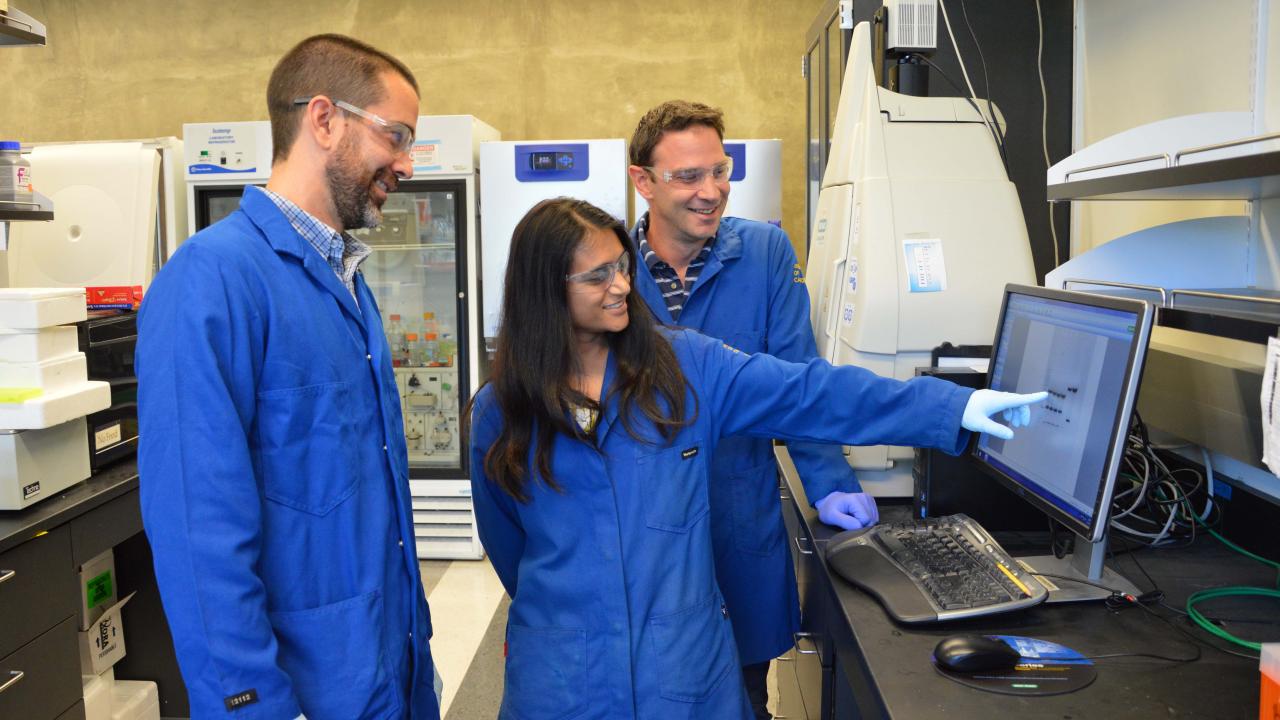Researchers at the University of California, Davis, and the University of Alberta, Canada, have made preliminary discoveries about how Zika and hepatitis C viruses reproduce at the cellular level, providing new insight into a family of viruses that also includes West Nile and dengue. Now their cutting-edge research will be supported by a $1 million grant from the prestigious W.M. Keck Foundation. The foundation primarily focuses on pioneering efforts in the areas of medical research, science and engineering, and undergraduate education.
The research has the potential to lead to new, more effective antiviral drug treatments. Millions of people could ultimately benefit, with 3.5 million cases of hepatitis C in the U.S. alone, 40 percent of the global population at risk for dengue fever (resulting in 390 million infections per year) and Zika emerging as a viral threat.
The recipients are UC Davis assistant professors Ben Montpetit of the College of Agricultural and Environmental Sciences and Priya Shah of the College of Biological Sciences and College of Engineering, and Associate Professor Christopher Fraser of the College of Biological Sciences, with partner Professor Richard Wozniak at the University of Alberta.
“Receiving this award was a big moment for us, especially since most of us are at an early stage in our careers as assistant or associate professors. This support speaks to the Keck Foundation’s important mission; they are willing to invest in young people and novel ideas, and give those things a chance,” said Montpetit, a cell biologist who will lead the three-year study.
“These findings could pave the way for the development of antiviral drugs that will better target the specific virus behavior we have discovered, which until now has been overlooked,” said Shah, who specializes in the study of virus biology. “This could help the millions of people affected by this particular family of viruses — the Flaviviridae virus family — and especially help prevent deaths in children and the elderly, who are more susceptible to the dangerous side effects of the fever associated with infection.”
Next steps fueled by UC Davis’ culture of interdisciplinary collaboration
Montpetit began his work with Wozniak during a previous appointment at the University of Alberta, where they made the initial discovery of the novel behavior of the Flaviviridae family of viruses.
Long established research suggested flaviviruses replicate only in the cytoplasm of a host cell, but the research team’s findings now indicate a critical role for the host cell’s nucleus in virus production. This sets the stage for a more complete understanding of these viruses and the development of targeted viral treatments that will more successfully suppress the virus or even completely stop it from replicating. The initial findings are expected to be published within the year.
Meanwhile, the research has continued at UC Davis with Shah and Fraser added to the team. Shah will allow the team to seek answers from a systemwide view of how host cells and viruses interact, while Fraser will focus on the molecular mechanics that explain why the virus needs to go into the nucleus of the host cell to reproduce.
“To further the research, we needed to assemble a team that had expertise in various areas that would allow us to quickly go after the major questions this project pursues,” Fraser said.
In addition to receiving financial support from the Keck Foundation and all of the colleges involved, as well as the UC Davis Office of Research, the research team will leverage interdisciplinary UC research facilities, known as “core facilities,” in imaging, proteomics and genomics, to continue their work this fall.
“Traditional government funding sources simply would not fund such novel and potential paradigm-shifting studies in their infancy, so this project would not be possible without support from the Keck Foundation and the support of UC Davis’ collaborative culture,” said Fraser. “We are incredibly grateful for the chance to continue research that could ultimately save lives.”
About the W.M. Keck Foundation
Based in Los Angeles, the W.M. Keck Foundation was established in 1954 by the late W.M. Keck, founder of the Superior Oil Company. The foundation’s grant making is focused primarily on pioneering efforts in the areas of medical, science and engineering research. The foundation also maintains an undergraduate education program that promotes distinctive learning and research experiences for students in the sciences and in the liberal arts, and a Southern California Grant Program that provides support for the Los Angeles community, with a special emphasis on children and youth from low-income families, special needs populations and safety-net services. For more information, please visit www.wmkeck.org.
Media Resources
Laura Pizzo, Development and Alumni Relations, 530-750-3115, lpizzo@ucdavis.edu
